Welcome to League of Pros - our new series of stories of people who work in Russian football and make it better.
The first story is about Zenit St. Petersburg agronomist Konstantin Kreminsky: how a person who entered university to study Economics became interested in working with pitches, and became one of the best in this profession.
"I became interested in being an agronomist in Ireland"
"I graduated from an agricultural university in Ukraine, but not as an agronomist. My field was Business Economics. We studied everything related to agriculture: how to grow a product, how much you need to spend, what kind of profit we will get: the specialization was more calculated. In 2008, I went to practice in Ireland to work and exchange experience. I got into a golf club, and I really liked the work of an agronomist.
Before that, I did not understand the nuances of the varieties of herbs, or when and what fertilizer to use. I only knew the simple rules for care. I have a summer cottage with a lawn to mow and water: no problem. In Ireland, I got the idea and started actively and independently studying this area. When I started working at the golf club, I talked to other managers and they shared their experience.
In 2010-11, I had a placement in America at a golf club through Ohio University, just related to lawns. In the golf industry American schools are the best for growing and caring for them, everyone goes there to study. They pay great attention to pests, diseases, nutrients, and which varieties are best used depending on the geographical latitude.
When I finished my work in America, I wrote to my supervisor thanking him for the chance to get training and experience. He told me: ‘If you want, there is an opportunity to work at Euro 2012.’ The manager sent a letter of recommendation about me to STRI – a British research institute that studies and tests lawns.
He was just looking for people who would help with the football pitches in Ukraine during the tournament. We can say that everything fell into place. Me and another guy who worked in America at another golf club contacted this company and had an interview.
"I would have stayed in golf if it hadn’t been for football"
I worked at the Metalist stadium in Kharkiv. I arrived there a year before the Euros, at the end of July. There the pitch was just being sown. The summer was very hot, and the grass was in shock: the process itself creates stressful conditions for it, and the temperature rose to 35-38 degrees. We had to prepare the pitch within two or three weeks before the first match at the stadium.
Not everything went smoothly. There were problems with the seeding machine, amongst other shortcomings. In general, routine work got underway to restore and prepare the pitch. It was very difficult, but if you sum up the whole period we did a great job for the first time. We worked in Kharkiv for a year, then went to the Olympic Games with a colleague after the Euros. He was in London and I was in Manchester.
At Old Trafford, as at other venues, there were their own agronomists, so I specialized more in the training pitches, where the national teams of Paraguay and Brazil were engaged, for example. We worked without any help. We made the plans and did everything ourselves. We had the necessary equipment, seeds, and fertilizers.
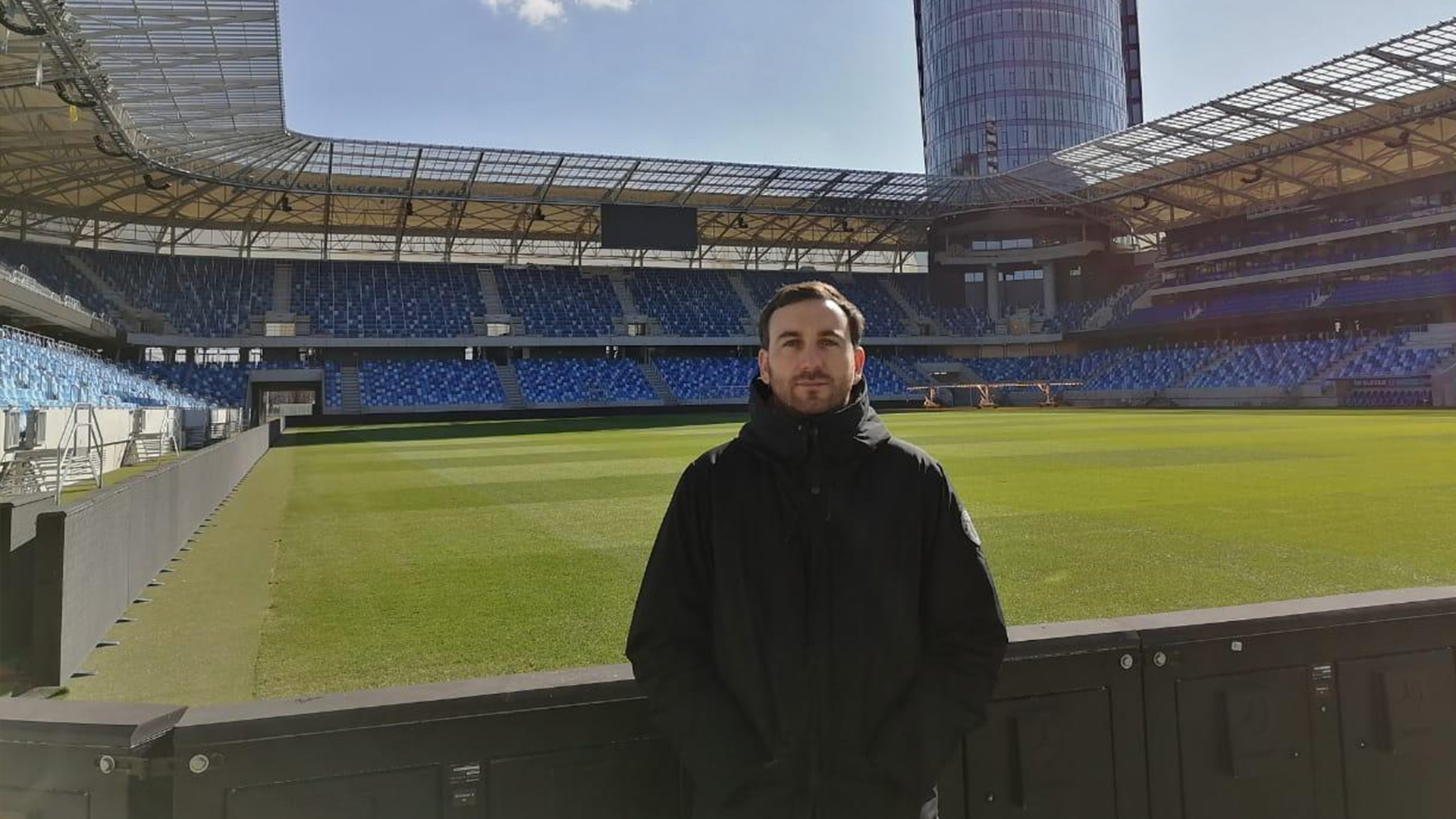
If it wasn't for the job offer in Kharkiv, I would have gone to work as an agronomist anyway, and if it hadn’t worked out with football, I would have stayed in golf where I started. This industry is just beginning to develop, and the scale of the fields there is larger than in football. The lawn at a stadium is like a business card of a football club. It should not only be stable in terms of characteristics and properties to withstand all loads, but also visually look beautiful. On golf courses, if there are problem areas that are generally blurred they aren’t given special attention.
"Two Champions League games in two days was a challenge for us"
After the Olympic games, the opportunity arose to work at Zenit, while the team were playing at the Petrovsky. I was interested in this, since I had never been to Russia. When I first came to St. Petersburg, I really liked the city itself. I love history and classics very much, and this city has won me over.
I knew that the climate here was particularly different from other countries – the same as in Ukraine, where there is a normal spring, a normal summer, and so on. I was told that there were big problems with the pitches due to difficult climatic conditions. And it became interesting to me that Zenit seriously decided to create conditions and make a natural surface that met international standards.
I arrived in December, and my first match was against Liverpool in the Europa League. I remember how the pitch was grown then: the grass was poor, unhealthy, and young. But when everyone saw the lawn, they were shocked: "This is impossible! How? On the street it is February, but the grass is green! We have never had grass at this time. The pitch is always black." Of course, it was nice. Although the pitch didn't look great, the picture was more or less green.

I remember the moment when Zenit played a Champions League match at the Petrovsky, and the next day CSKA played there too because of problems with the pitch in Khimki. I think it was an accomplishment for us. There has never been such a story in my life.
Journalists kept asking if the pitch would hold up, and I was sure of it. It looked great, tough and strong. Only the red top press began to make a drama by twisting my words: "’Petrovsky Agronomist’ is not sure, doesn’t know whether the pitch will withstand two matches in a row."
First, Austria Vienna trained at the stadium ahead of playing Zenit the next day, and then there was a match between CSKA and Viktoria Plzen. We were sweating on this pitch, but overall it was a great time; I liked the Petrovsky very much. It feels like you've come from a big city to visit your grandmother.
When Andre Villas-Boas arrived, the management decided to change the pitch after the season so that the team would play on a new pitch under a new coach. The contractor re-lay it, and then I was directly involved in the preparation. So I worked smoothly at the Petrovsky, and then together with the club moved to Gazprom Arena.
"It’s great when you work in a multi-functional team"
If you take all our facilities - the stadium, the training ground, the Academy - our team consists of 20 people. There are nine employees working at the stadium, which is above average. Since the pitch is located in the bowl of the arena, you have to create artificial conditions to preserve the lawn, because there are no natural conditions at all - even the simplest lighting or air circulation.
That is why we need people who can create such conditions with the help of fans and lighting lamps. I know that many other stadiums employ four or five people. The same number of us were at the Petrovsky, because it was no longer necessary to work under natural conditions.
These were ordinary guys who came without experience. We taught them everything and sent them on courses. My task was to create a universal team, so that people could perform various functions and not get hung up on individual details. People themselves get tired of monotonous work and lose interest because of this. It's great when you have a multi-functional team where everyone can mow, treat the lawn or apply fertilizer. If a person solves different tasks every day, their interest remains because the work does not let them get bored.
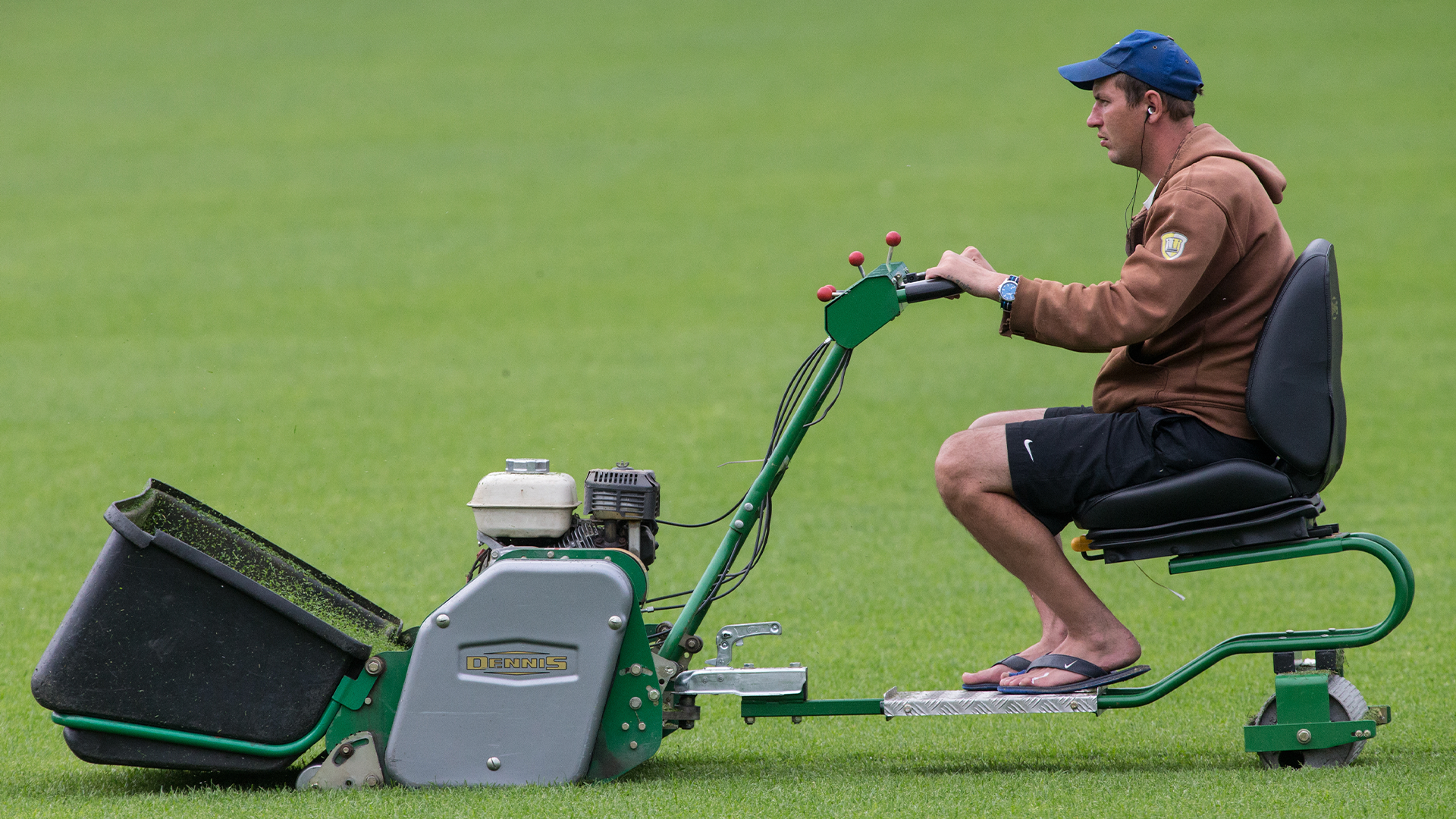
Now I delegate the duties to the foreman, a capable, responsible guy, and I have control of the pitches. There are only seven of them - there used to be eight with the Petrovsky - and it takes a lot of time to keep track of everything. Even if you just need to treat the pitch or apply fertilizers, you need to do it very carefully so that there are no side effects.
I usually go to the training ground on Mondays and Tuesdays, to the stadium on Wednesdays, to the Academy on Thursdays, and back to the training ground on Fridays. I also spend matchdays in the arena. I now spend time where the team is working more often to prepare the fields as well as possible. There are cases after a long break when players want to train two or three times at the stadium to get a feel for the pitch. We meet them halfway and completely switch to prepare the stadium pitch.
We are constantly in touch with the team manager. He gives us the information of the coaching staff. This process concerns not only pitches but also food and accommodation at the training ground. So that everyone doesn’t call the head coach and doesn’t distract him and his assistants from work, everyone contacts the team manager, who generates everything and informs the coaching staff.
Sergey Semak always demands a certain standard. I remember that at the World Cup they set a uniform height for grass - 25 millimeters - but the coach of the German national team asked each arena to make it very, very short: up to 20 millimetres or less.
It was a shock: there would be virtually no grass at all. It is clear that this would be good for the Germans - they would play and leave - but then the rest of the teams would play, and the shorter the grass, the faster it would be worn out. I haven't heard of anyone who ended up mowing a pitch purely for Germany. Everyone followed the same rule, so that both teams were on equal terms.
"We worked at the stadium from eight in the morning, and got home a day later"
When we plan work, we look at how many matches will take place in a particular month. For example, in March there were three consecutive home games that were played a week apart. It was very difficult, because the pitch was deep in the stadium, and it was necessary to quickly restore everything so that it did not lose its properties for the next match. Sometimes people went out at night to put up lamps.
It is very important to prepare for such periods in advance. No one starts doing it a day or two before. You need to increase the base, make it strong for any loads, grow it for a very long time and pay special attention. When you have a strong, healthy surface, it will survive even three matches and recover itself.
You only correct it, give it a visual appearance, and it retains all other properties. It also depends on what time the match ends. If it is late we immediately do the minimum such as remove the goals and flags, and the next day we work quickly to clean up waste, repair, and fertilize.
On a matchday, the pitch is usually inspected at 10:30. With this in mind, we go out to prepare it at 8:30-9:00. If the game ends at 10-11pm, it means people work for 15-16 hours, which is very difficult. If a person spends a lot of time at work, they lose concentration and don’t try, or if they do, it is just to go home faster. Therefore, it is better to carry out the main work on the pitch the next day.
Sometimes we left the stadium at three or four in the morning. When we were still working at Petrovsky, and a European match was ending, we had to stop to cover the field. The same thing happened at the Gazprom Arena during the Confederations Cup and the World Cup. Then the matches were separated by two or three days, and we carried out all the work immediately after each game.
Our working day didn’t last from nine in the morning to six in the evening. I remember when we changed the pitch before the Confederations Cup, I worked at the stadium from eight in the morning, and came home a day later at about 6-7am. Then we had to finish the work completely so that the lawn did not rot or dry out, and we quickly rolled it out. This is generally wrong, but sometimes there are times when you need to complete the work, and you have to sacrifice your time.
"A web was cut on the Petrovsky pitch without stencils"
Last August, there was a Rammstein concert at the Gazprom Arena, and the next day Zenit played FC Krasnodar. We prepared the pitch outside the stadium, while the stadium staff and organizers removed the entire structure. It was a huge amount of work in a short period. Then the pitch was quickly rolled inside.
In general, when the football stadium hosts a concert, it all depends on the climate and preparation of the surface: how long it will be covered, or what type of cover will be used. It needs to be breathable so as to not choke the pitch. We need a joint set of measures with the organizers taking into account what kind of structures they use, and how long the stage will stand.
In 2015, Muse performed at the Petrovsky, but there was no pitch to roll out. We came out of it with relatively few scratches. Yes, the grass was trampled, a lot of alcohol was spilled and the field was under stress for some time, but after three or four days it recovered.
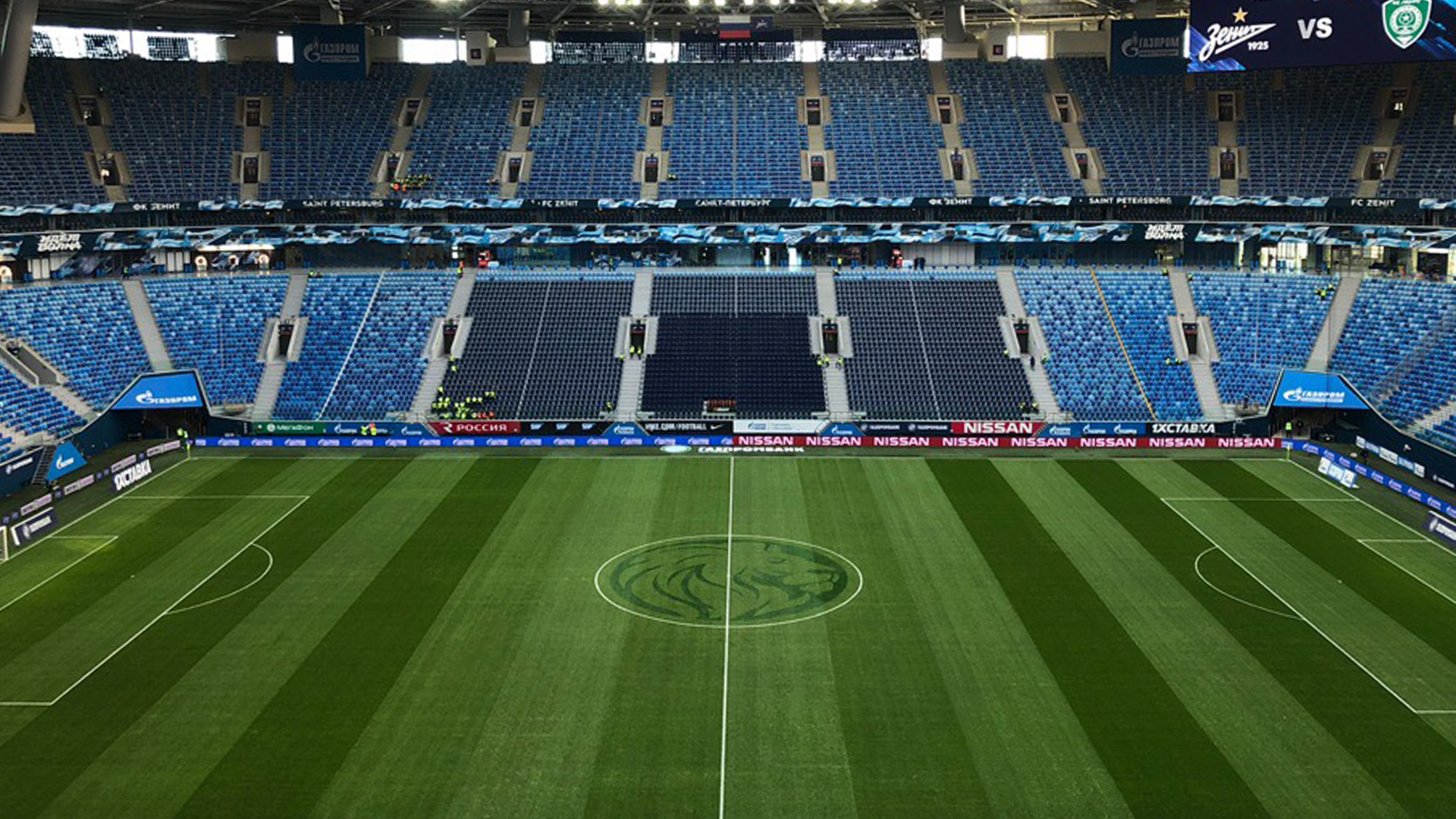
The lion that was drawn in the centre of the pitch before the match against Akhmat in November 2018 was part of a PR campaign. There is a special American-made vehicle for such cases which uses air to lay the grass in the right direction, but it is very expensive and is not profitable for us.
We considered two options: cutting and painting. In the drawing of a lion, there are many fine details, such as the mane and eyes, and it is impossible to make them with a mower. Therefore, we chose the option of painting. We ordered stencils and painted them on using a special green biological paint that does not harm the grass.

Back in 2014, we cut a web on the Petrovsky pitch. Nike had an ad campaign for new boots, and it was linked to a web, so we offered to do this on the pitch. Of course, it was difficult. We sat and calculated mathematically where and what part of the web should be used and from which side it should go. The preparation took a very long time; about two weeks. First we made the first drawings, then we checked how it looked. They either zoomed in or zoomed out. Here we worked without stencils, and it turned out well.
“The pitch is already ready to resume the season"
In mid-April I visited the Gazprom Arena for the first time since the championship was stopped. The pitch looks very good now, and it has recovered from three consecutive matches in March. Our team is divided into groups, and we go to the stadium for specific tasks such as mowing the grass or filling in the fertilizer, so we don't go to work every day.
The composition of groups depends on the tasks. For example, for the same mowing of grass or sprinkling of fertilizers, no more than two or three people are needed. We arrive, do everything quickly, and leave. The stadium management have requested that employees only travel by taxi, not by public transport, to protect themselves from infection with the coronavirus and reduce contact with people.
My assistant usually works in the arena. She periodically visits the arena and fires over information to me, and we jointly decide what else to do with the pitch. I go to the Gazprom Training Centre more often. There are five natural pitches, and when it is possible to return to training, the team will first go there to get in shape.
We are actively working to restore the pitches. Three of them are already ready, and two more need to be touched up. I arrive at the training ground at the beginning and end of the week.
The pitch itself is already ready to resume the season. We will only need to mow the grass to the desired height, lay out markings and put up the goals. The same applies to the training ground, but the layout is slightly different from the playing surface."





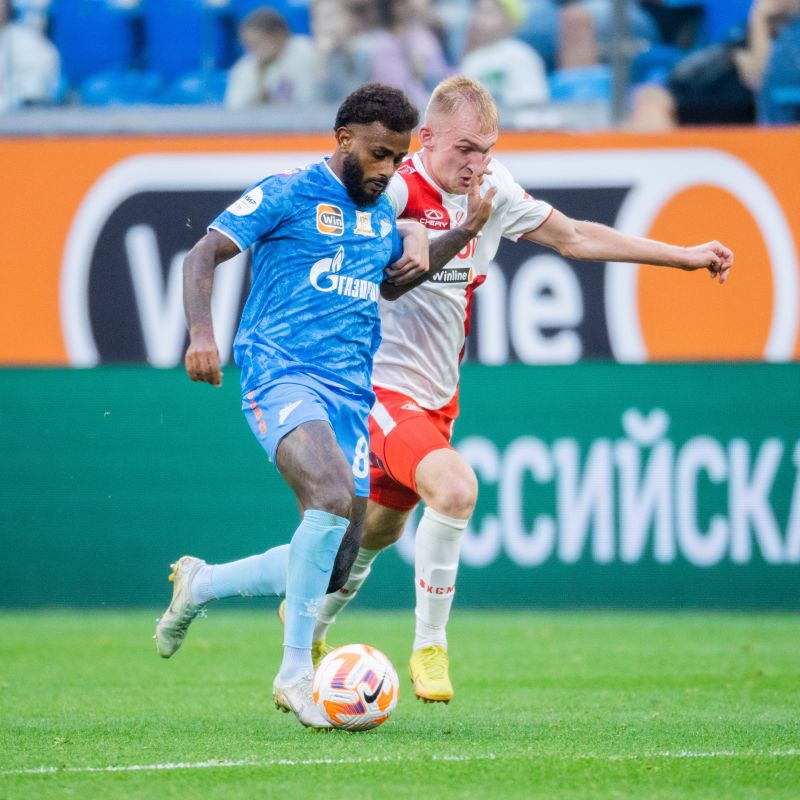
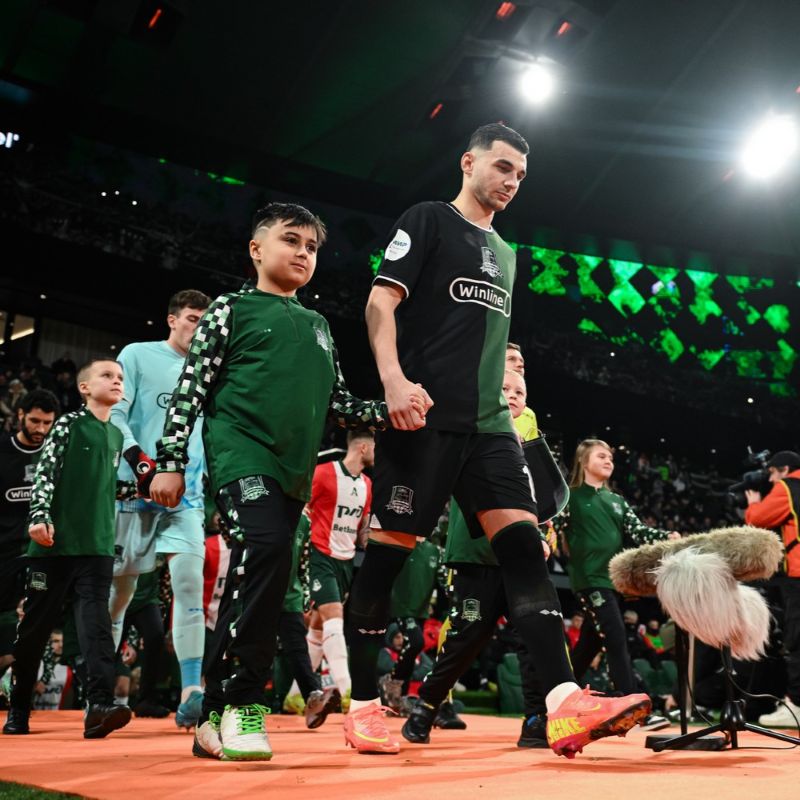
Обратная связь
Вы можете обратиться в РФПЛ с интересующим Вас вопросом или оставить сообщение (пожелание, замечание). Также вы можете сообщить имеющиеся у вас сведения о "договорных" матчах.